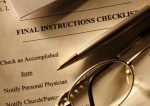Funeral Planning: Create a List of Contacts and Personal Information
 Some of the best (and lowest-cost) funeral planning efforts don’t involve buying or arranging anything. In fact, before you do any concrete planning, it’s a good idea to sit down and organize your fiscal and personal information so that everything you need is in one place. By taking an extra step to outline your funeral wishes and to provide a copy of this information to the individual who will be responsible for your estate after your death, you can save quite a bit of time and effort.
Some of the best (and lowest-cost) funeral planning efforts don’t involve buying or arranging anything. In fact, before you do any concrete planning, it’s a good idea to sit down and organize your fiscal and personal information so that everything you need is in one place. By taking an extra step to outline your funeral wishes and to provide a copy of this information to the individual who will be responsible for your estate after your death, you can save quite a bit of time and effort.
Personal Information
This sheet should contain all the basic facts about you and your history. This will be used to issue a death certificate and to help write an obituary.
- Full Legal Name
- Other/Maiden Names
- Social Security Number
- Date of Birth
- City and State of Birth
- Mother’s Maiden Name
- Father’s Name
- Marital Status/Spouse or Partner Name
- Wedding Date and Place
- Children’s Names
- Armed Forces History
- Education
- Driver’s License Number
- Passport Information
Funeral Plans
You don’t have to pre-pay for a funeral or have concrete plans in place, but it is a good idea to outline your general wishes on paper. This will help your loved ones as they plan your funeral and move through grief.
- People to Be Notified of Death (with Phone Numbers)
- Pre-Plan Information (Including Funeral Home and Plan Documents, if Applicable)
- List of People Responsible for Funeral Planning
- Preferred Funeral Home
- Preferred Interment Method
- Clothing/Jewelry to Be Buried In
- Ceremony Preferences
- Funeral Officiant Name and Contact Info
- Music/Reading Preferences
Key Contacts
Finalizing paperwork related to death and finances takes the combined efforts of many people. Keep this list to help your family know who to contact for help.
- Executor to Your Estate
- Lawyer
- Accountant
- Insurance Agent
- Financial Broker/Advisor
- Banker
- Employer (Past and Present)
- Union Representative
- Landlord
- Doctor(s)
- Dentist
Insurance Information
Insurance is often cited as the most stressful thing to deal with after a loved one dies. Make it easier by providing the company, ID numbers, policy numbers, and contact information for the following insurance types.
- Medical
- Medicare/Medicaid
- Life
- Funeral
- Annuity
- Accidental Death & Dismemberment
- Dental
- Disability
- Long Term Care
- Homeowners
- Automobile
Documentation
Keeping all your records in one place is a smart move no matter what. Go one step further and place these items in a fire-proof safe in case of emergency.
- Will
- Birth Certificate
- Citizenship Certificate
- Military Discharge
- Diploma
- Insurance Policies
- Marriage Certificate
- Divorce/Annulment Papers
- Trust Documents
- Property Deed
- Vehicle Title
- Passport
- Social Security Card
- Safe Deposit Box Key
Financial Information
Your financial information can include a number of accounts (both past and present). Because of the sensitive nature of this list, only share it with professionals and family members you trust, or keep it in a locked location in your home.
- Safe Deposit Box
- Savings Account
- Checking Account
- Money Market Account
- ATM/Debit Card Information
- Certificate of Deposit
- IRA
- Roth IRA
- Brokerage Account
- Mutual Fund Account
- Company Pension
- Union Pension
- 401(k)/403(b) Plan
- Mortgage Information
- Home Equity Line of Credit
- Reverse Mortgage
- Credit Cards
At first, these lists might seem overwhelming; after all, this is a lot of information to gather and keep in one place, and it can be especially hard if you’re facing a terminal illness. However, having your records together like this is also helpful in everyday life (if you need to apply for a loan), and once everything is together, you only have to update the information every few years or so.



